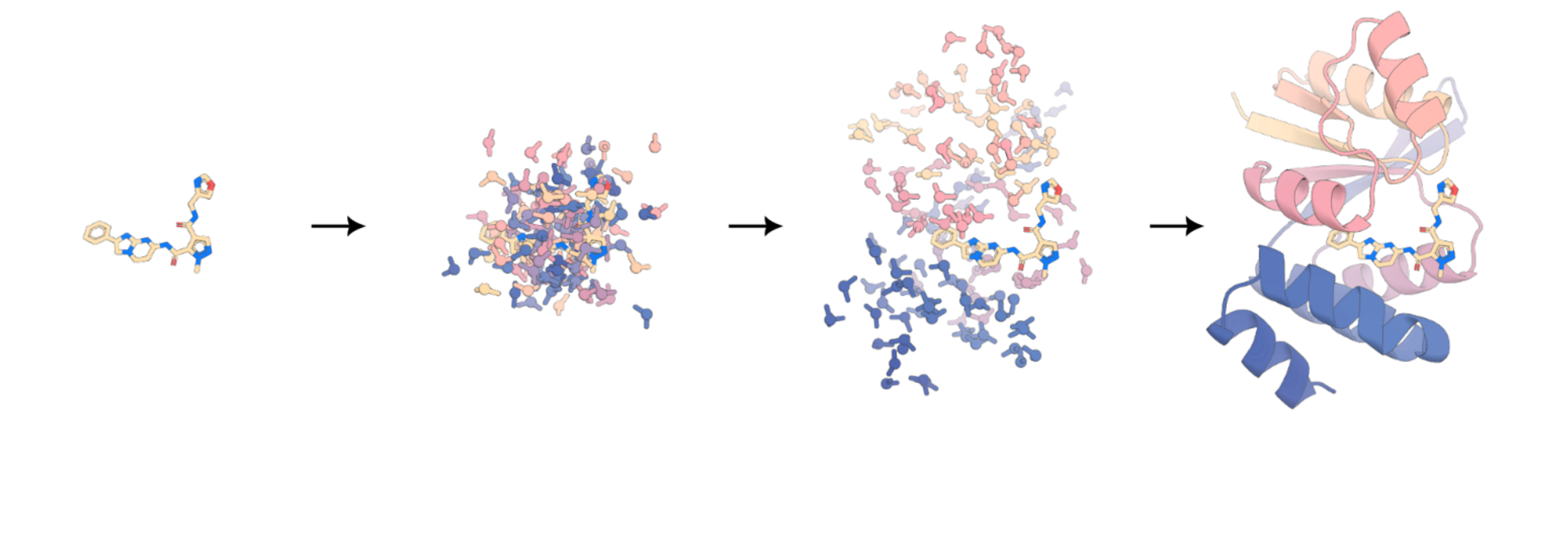- Clone the package
git clone https://github.com/baker-laboratory/rf_diffusion_all_atom.git
cd rf_diffusion_all_atom
- Download the container used to run RFAA.
wget http://files.ipd.uw.edu/pub/RF-All-Atom/containers/rf_se3_diffusion.sif
- Download the model weights.
wget http://files.ipd.uw.edu/pub/RF-All-Atom/weights/RFDiffusionAA_paper_weights.pt
- Initialize git submodules
git submodule init
git submodule update
- Install Apptainer
Install apptainer if you do not already have it on your system. This will allow you to run our code without installing any python packages using a prepackaged sif: https://apptainer.org/docs/admin/main/installation.html
To generate a binder to the ligand OQO from PDB 7v11, run the following:
Example (ligand binder):
/usr/bin/apptainer run --nv rf_se3_diffusion.sif -u run_inference.py inference.deterministic=True diffuser.T=100 inference.output_prefix=output/ligand_only/sample inference.input_pdb=input/7v11.pdb contigmap.contigs=[\'150-150\'] inference.ligand=OQO inference.num_designs=1 inference.design_startnum=0
Note: The --nv flag must be omitted if not using a GPU.
Explanation of arguments:
inference.deterministic=Trueseeds the random number generators used so that results are reproducible. i.e. running with inference.design_startnum=X will produce the same reusults. Note that torch does not guarantee reproducibility across CPU/GPU architectures: https://pytorch.org/docs/stable/notes/randomness.htmlinference.num_designs=1specifies that 1 design will be generatedcontigmap.contigs=[\'150-150\']specifies that the length of the generated protein should be 150diffuser.T=100specifies the number of denoising steps taken.
Expected outputs:
output/ligand_only/sample_0.pdbThe design PDBoutput/ligand_only/sample_0_Xt-1_traj.pdbThe partially denoised intermediate structuresoutput/ligand_only/sample_0_X0-1_traj.pdbThe predictions of the ground truth made by the network at each step
Note that the sequences associated with these structure have no meaning, apart from the given motif. LigandMPNN or similar must be used to generate sequences for the backbones if they are to be used for structure prediction / expression.
To include protein residues A430-435 in the motif, use the argument contigmap.contigs. e.g. contigmap.contigs=[\'10-120,A84-87,10-120\'] tells the model to design a protein containing the 4 residue motif A84-87 with 10-120 residues on either side.
Example (ligand binder with protein motif):
/usr/bin/apptainer run --nv rf_se3_diffusion.sif -u run_inference.py inference.deterministic=True diffuser.T=200 inference.output_prefix=output/ligand_protein_motif/sample inference.input_pdb=input/1haz.pdb contigmap.contigs=[\'10-120,A84-87,10-120\'] contigmap.length="150-150" inference.ligand=CYC inference.num_designs=1 inference.design_startnum=0
An end-to-end design pipeline illustrating the design of heme-binding proteins using RFdiffusionAA, proteinMPNN, AlphaFold2, LigandMPNN and PyRosetta is available at: https://github.com/ikalvet/heme_binder_diffusion
